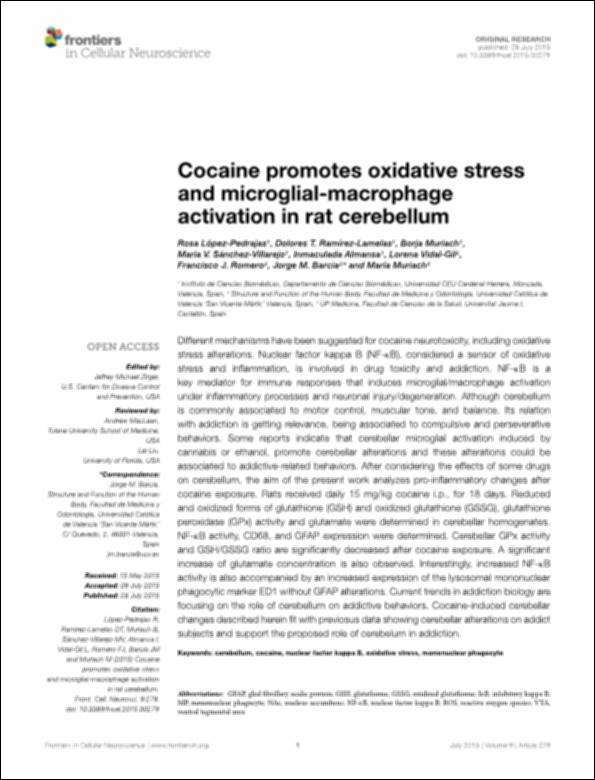Por favor, use este identificador para citar o enlazar este ítem:
http://hdl.handle.net/10637/16040Cocaine promotes oxidative stress and microglial-macrophage activation in rat cerebellum
| Título : | Cocaine promotes oxidative stress and microglial-macrophage activation in rat cerebellum |
| Autor : | López Pedrajas, Rosa María Ramírez Lamelas, Dolores Tania Muriach Saurí, Borja Sánchez Villarejo, María Victoria Almansa Frías, María Inmaculada Vidal Gil, Lorena Romero Gómez, Francisco Javier Barcia González, Jorge Miguel Muriach Saurí, María |
| Materias: | Cocaína; Cocaine; Estrés oxidativo; Oxidative stress; Cerebelo; Cerebellum; Neurología; Neurology; Neuronas; Neurons |
| Editorial : | Frontiers Media |
| Citación : | López-Pedrajas, R., Ramírez-Lamelas, D.T., Muriach, B., Sánchez-Villarejo, M.V., Almansa, I., Vidal-Gil, L., Romero, F.J., Barcia, J.M. & Muriach, M. (2015). Cocaine promotes oxidative stress and microglial-macrophage activation in rat cerebellum. Frontiers in Cellular Neuroscience, vol. 9, art. 279 (28 jul.). DOI: https://doi.org/10.3389/fncel.2015.00279 |
| Resumen : | Different mechanisms have been suggested for cocaine neurotoxicity, including oxidative stress alterations. Nuclear factor kappa B (NF-κB), considered a sensor of oxidative stress and inflammation, is involved in drug toxicity and addiction. NF-κB is a key mediator for immune responses that induces microglial/macrophage activation under inflammatory processes and neuronal injury/degeneration. Although cerebellum is commonly associated to motor control, muscular tone, and balance. Its relation with addiction is getting relevance, being associated to compulsive and perseverative behaviors. Some reports indicate that cerebellar microglial activation induced by cannabis or ethanol, promote cerebellar alterations and these alterations could be associated to addictive-related behaviors. After considering the effects of some drugs on cerebellum, the aim of the present work analyzes pro-inflammatory changes after cocaine exposure. Rats received daily 15 mg/kg cocaine i.p., for 18 days. Reduced and oxidized forms of glutathione (GSH) and oxidized glutathione (GSSG), glutathione peroxidase (GPx) activity and glutamate were determined in cerebellar homogenates. NF-κB activity, CD68, and GFAP expression were determined. Cerebellar GPx activity and GSH/GSSG ratio are significantly decreased after cocaine exposure. A significant increase of glutamate concentration is also observed. Interestingly, increased NF-κB activity is also accompanied by an increased expression of the lysosomal mononuclear phagocytic marker ED1 without GFAP alterations. Current trends in addiction biology are focusing on the role of cerebellum on addictive behaviors. Cocaine-induced cerebellar changes described herein fit with previosus data showing cerebellar alterations on addict subjects and support the proposed role of cerebelum in addiction. |
| URI : | http://hdl.handle.net/10637/16040 |
| Derechos: | http://creativecommons.org/licenses/by/4.0/deed.es Open Access |
| ISSN : | 1662-5102 (Electrónico) |
| Fecha de publicación : | 28-jul-2015 |
| Centro : | Universidad Cardenal Herrera-CEU |
| Aparece en las colecciones: | Dpto. Ciencias Biomédicas |
Los ítems de DSpace están protegidos por copyright, con todos los derechos reservados, a menos que se indique lo contrario.


